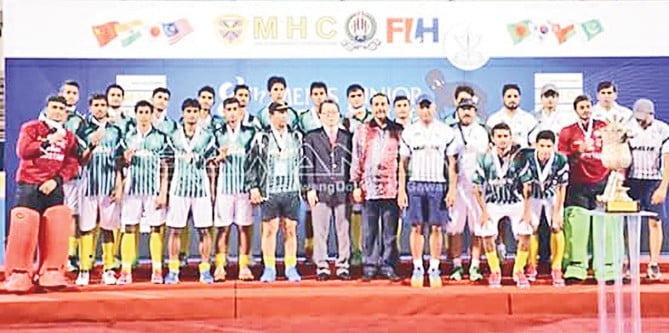

Pakistan’s second position at the Junior Asia Cup has rekindled hopes for the revival of hockey. It was remarkable since the team had ended last at the Sultan of Johor Cup among six sides only a few weeks before.
Despite a disappointing finish, head coach Tahir Zaman had sounded optimistic for the Junior Asia Cup and his side did bounce back at Kuantan.
Tahir, who in his distinguished international career (1987-98) also captained Pakistan, is FIH‘s Grade 1 High Performance Senior Coach.
In addition, he is also the FIH Academy Coach Educator -- the only Asian to have this status.
A world class inside right in his halcyon days, Tahir has coached the national sides of Azerbaijan (women), Egypt (men) and Barbados (men and women).
"Finishing last in the six-nation tournament, so close to a vital title event like the Junior Asia Cup which doubled up as the Junior World qualifier, was indeed a cause of great concern," said Tahir in an interview with ‘The News on Sunday’.
"More so as Pakistan’s senior national side’s failure to qualify for the 2016 Olympics meant that the juniors’ qualification was essential for hockey’s survival in the country. Otherwise, the interest of the general public as well as the sponsors, both government and private, would have vanished," he said.
Why was he still hopeful? "The boys are talented. The main shortcoming seen at the Johor Bahru was the lack of cohesion which was mainly down to inexperience. There was hardly any activity at the junior level over last two years. This squad was put together only a few weeks before the tournament. Despite finishing last, they had given hints of their potential against experienced teams including those of Australia, Britain and Argentina apart from India and Malaysia, the two Asian heavyweights. "One encouraging result was also achieved; the draw against Britain, the eventual winners.
"That said there were definitely many grey areas both in defence and attack. We had conceded 22 goals and scored only five. Fitness too was not satisfactory. On top of it, the players’ morale was at the lowest ebb," he conceded.
How was all this taken care of? "During the camp, special attention was paid to the technical deficiencies identified at Johor Bahru. To develop understanding among the players, there is no substitute to match practice. A four-match series was arranged against Pakistan ‘A’ side consisting of the best available among the national senior team’s players. That proved to be real handy. Team work went better with every match.
"Physical fitness for fast-paced sports such as hockey has become a science. We requested Pakistan’s former hockey captain Rana Ghazanfar, who has been working in England for many years as a physical fitness consultant. He is a level III fitness coach working with the Liverpool Football Club‘s academy; has had a little stint even with Liverpool’s premier league team. He also holds a diploma in sports psychology and has done modules in nutrition as well. Despite his professional commitments in England, Ghazanfar joined the team at the camp and stayed with them throughout the tournament. His efforts made a big difference. A motivated, physically fit and well-coordinated Pakistan side impressed everyone in Malaysia. In almost every game, their display was better than the opponents in the second half and many an important goals were scored in the dying minutes.
"Of course, the opposition was weaker as compared to that in Johor Bahru. But all remarked, "Pakistan seemed to be a totally transformed side".
What went wrong in the final? "The defeat by 2-6 margin was indeed a great disappointment. As per the form book, the Indians were the favourites. Still, I had expected a better performance from Pakistan. The inexperience showed. The boys were overawed by the occasion. Only a few weeks back, they had played for the wooden spoon in the same country and now they were appearing in the final of a high profile title tournament.
"We had done some homework. India relied a lot on the drag flicker Harmanpreet Singh, the tournament’s top scorer. Goalkeeping was our weakest link. Hence, the strategy was to avoid giving penalty corners. The players were instructed to play it safe within the 23. But the nerves got the better of them. In over exuberance some rash challenges were made.
"Here, I must acknowledge the efforts of the Indians who cleverly crafted penalty corners. Harmanpreet converted four of the five penalty corners and we were never in it. Nevertheless, Pakistan persisted with the attacking game and created chances; even dominated some phases.
"India had arrived as a well prepared side. Their junior squad had been playing together for more than two years. Moreover, most members of their team had figured in the Hockey India League, thus getting invaluable experience of playing with and against the world’s best players."
Future Plans? "There is a long way to go. Many aspects need to be looked at. The national juniors’ championship in February is a good opportunity to look for new talent. We want to provide the boys with maximum international exposure. There are bright chances for a tour to Australia and New Zealand in April.
"Negotiations are also underway with some major European hockey nations for a tour during summer; two have given confirmation. In England, we might acquire the services of goalkeeping coach John Hurst to train our net minders. Hurst, a former international, has been involved with the development of a number of world class goalkeepers, men and women.
"Before returning to England, Ghazanfar chalked out comprehensive fitness and nutrition plans for all the players, and he has been in constant touch with the players.
"Pakistan should enter the Junior World Cup in December, 2016, as serious challengers to all the top teams; not among the also rans," said Tahir, who starred in Pakistan’s last World Cup victory (1994).